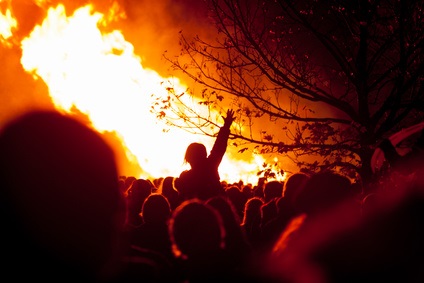The idea that where there is blame there is a claim is well-defined in law but there are situations where unforeseen accidents can happen. While bonfire night this year will hopefully pass with  minimal injuries and distress, fireworks and private parties are some of the more searched for situations when it comes to personal injury claims and liability.
minimal injuries and distress, fireworks and private parties are some of the more searched for situations when it comes to personal injury claims and liability.
Private Bonfire Night Party
In general when hosting a private bonfire night party you will be covered by your general household insurance although it is worth double checking – as well as reading the small print. Fire is a general hazard in and around the home which is covered by general household insurance so it makes sense that in the right circumstances there is also potential cover for accidents relating to bonfire night and fireworks. The main problem is when safety advice is ignored, bonfires are lit in dangerous areas and there is a reduced regard for the safety of those in the vicinity as well as their property – this is when personal injury claims may be made.
We know from feedback supplied by the insurance industry that November 5th is the worst night for fire damage claims after Christmas Day. In general it tends to attract a 50% increase in claim numbers relating to fire damage and rather surprisingly a 40% increase in claims for malicious damage to vehicles. So, who is liable in the event of an accident directly relating to a commercial bonfire or firework display?
Commercial Events
As you might have guessed, commercial events such as bonfires and fireworks displays have to have their own specific insurance cover in the event of accidents and potential claims for personal injury. Initially these events have to complete a safety review/ risk assessment and ensure that they not only abide by the health and safety regulations but also use appropriate materials and fireworks for their display. This is the difference between commercial fireworks and those for use by the general public.
There are specialist companies offering commercial insurance for professional firework events which will cover an array of incidents ranging from a stray spark setting off a firework or a member of the general public being burned or injured by a firework which has gone off unexpectedly. Traditionally insurance cover will need to be in place at least 14 days prior to an event which gives peace of mind to both the organisers and those in attendance. It is also worth noting that issues such as the safety of the ground surrounding a bonfire or a firework display will need to be addressed, the position of the crowd when the fireworks are lit as well as controlled evacuation in the event of unforeseen incidents.
Firework Manufacturers
In reality where fireworks and bonfires are involved there is obviously an increased degree of danger. In many ways it is the duty to take reasonable care when organising these events which comes under more scrutiny in the event of accidents and injury. Many people forget that the firework manufacturers also have a duty of care to supply products in line with health and safety standards.
In the event of accidents caused because of faulty fireworks or issues with other commercially supplied equipment there may be recourse to the manufacturer/ retailer in the event of a personal injury claim.
Private Parties
In simple terms the difference between a private party and a commercial event is the fact that those attending either pay to attend or attend by invitation. Where no monies change hands this is classed as a private party which does impact the level of insurance required but not necessarily the exposure to injury caused as a result of negligence. The law surrounding “negligence” is not straightforward and it will fall upon the opinion of the judge if a claim does make it to court.
In general, if you have people round to a private party you still have an obligation to ensure their safety as far as possible. If there is faulty equipment in the home this is dangerous, perhaps paving stones are cracked or missing, or maybe there are holes in your back garden which could also cause injury. In many ways if you take a common sense approach to private parties and the safety of your guests then you should be okay. It is also worth noting that just because a person may be inebriated or under the influence of drugs this may not necessarily remove liability in the event of an accident. In reality it may reduce any potential claim but it may not necessarily lead to a personal injury claim being dismissed.
The Law Of Negligence
Whether attending a commercial bonfire or private party, those hosting the event have an obligation to ensure the safety of their guests and visitors. The law of negligence features very prominently where personal injury cases are brought to court and the term “reasonable measures taken” will also be considered. As with any other personal injury claim, evidence should be gathered at the scene of the incident, supporting documentation provided and where applicable witness details and witness statements taken.
There will be cases where a third party is found liable for injury and an out-of-court settlement or court determined ruling is made. However, there will be cases where injuries occur where no party is liable, where negligence has not been proven and individuals or companies have done all in their power to protect members of the public. Just because someone has been injured does not automatically mean a third party is at fault and should pay the price. This is perfectly demonstrated by the laws surrounding bonfires and fireworks which attract a greater degree of danger of which all attendees to events are aware of. Follow the safety guidelines, issue the relevant warnings and there is no reason why you should not enjoy an incident free event and fulfil all of your legal obligations in relation to health/ safety and negligence.



